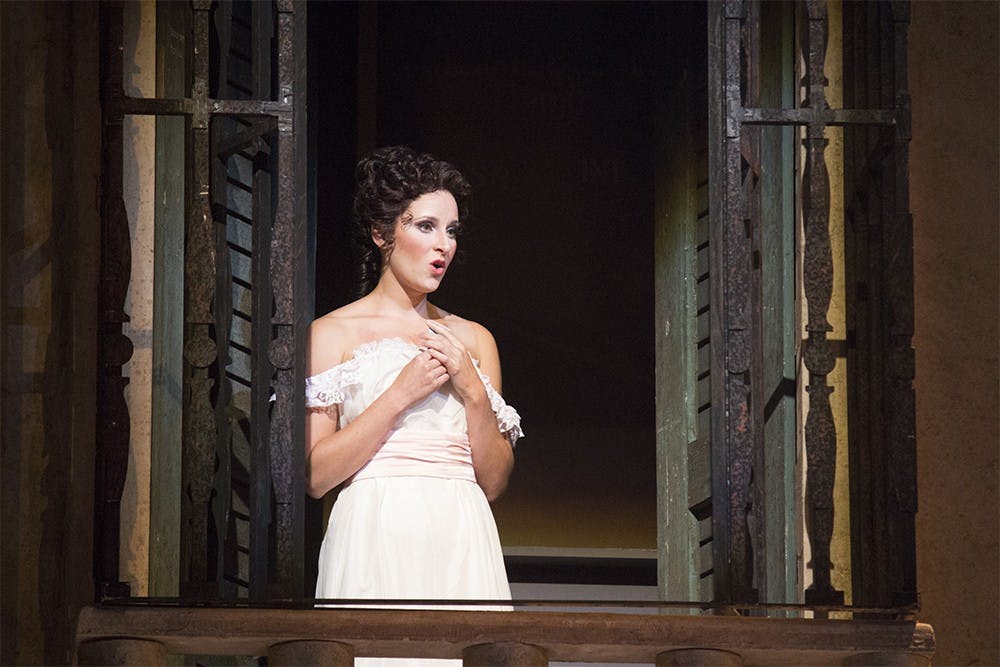Count Almaviva, played by Jacobs School of Music second-year master’s student Lucas Wassmer, stepped into focus as he began singing to the window of the woman he loves.
Thus began the first full dress rehearsal for IU’s production of “The Barber of Seville” on Monday evening. The show opens the 2015-16 season of IU Opera & Ballet Theater at 7:30 p.m. Friday, Sept. 18.
The show will run through Sept. 26. Single tickets for the opening performance are $25 for adults and $12 for students, and seating is general admission.
“The Barber of Seville” is a comic opera by Gioacchino Rossini that premiered in 1816.
The story is centered on the character Figaro, a barber who helps Count Almaviva rescue Rosina, the girl he loves, from the man who plans to marry her.
“The Barber of Seville” is an “escape opera,” stage director Garnett Bruce said, and it involves Figaro using his wit to help humanity and save characters from predicaments.
The production features two different casts who will alternate between shows.
Having two casts allows for two different interpretations of the show, Bruce said. Each singer can demonstrate his or her own characterizations.
Bruce said “The Barber of Seville” is a well-known opera with music that even those who are unfamiliar with opera will be able to recognize because of its prevalence in popular culture.
“Thanks to Bugs Bunny, we all know about Figaro,” he said.
The audience should be prepared for performances to last about three hours, since operas use long musical themes throughout the show, Bruce said. He said the length allows audiences to connect with the music and the story.
“Opera gives you the time to expand and to contemplate and to appreciate the beauty and the journey the character will make,” he said.
Bruce said “The Barber of Seville” will appeal to audiences because of its comedic elements, as it is full of disguises and surprises.
The element of contrast adds humor to the opera, Bruce said. Musical contrasts with low and high sounds and fast and slow speeds are particularly prevalent.
Rossini took his music beyond the borders of classical music, Bruce said.
“The Barber of Seville” features conductor Paul Nadler, who has conducted this piece all over the world, including at the Metropolitan Opera.
“He’s able to shape us, lead us and give room for ideas to expand,” Bruce said.
Putting together a production of “The Barber of Seville” is like a meal that combines an old recipe that has worked for years and fresh ingredients, Bruce said. The recipe is Rossini’s famous opera, and the ingredients are the performers.
“These people really know how to bring it alive,” Bruce said.
Bruce said one of the most exciting parts is the magic of the ensemble, when the characters and the chorus sing together all at once.
“When you’re an audience member at a Rossini opera, you sort of get caught up in the breathlessness of it, because you keep wondering if it’s going to fall apart,” Bruce said. “It’s like NASCAR — are we going to get into a car wreck? Are we driving too fast around the track?”
One of the reasons the opera remains popular is because it relies on the ingenuity of the performers, he said.
Bruce said it was a great joy to work with the students because they are encountering the material for the first time and bringing a youthful energy to the work.
Connor Lidell, a first-year master’s student studying vocal performance in the music school, plays the character Don Basilio in one of the casts of the opera. He said his character was a mercenary who sides with whichever character has the most money to pay him.
Lidell said his favorite part about being in the opera was the immersive experience of performing in front of an audience.
“There’s so much magic in storytelling that you only get on the opera stage,” he said.
Monica Dewey, a master’s student in the music school, said she enjoyed performing with her colleagues. Everyone brings something to the table, she said, and they work with each other to see what works.
Dewey plays the role of Rosina in one of the casts of the production.
Learning a whole opera is a long process because she has to sing in Italian, she said. Not only does she have to learn the correct pronunciations of every word, but she also has to know the translations so she understands the meaning of what she is singing.
“Rossini is particularly challenging because it’s a lot of notes,” Dewey said. “It’s what he’s known for — lengthy phrases and really virtuosic singing.”
Bruce said opera can become a melting pot because of the way it spreads across cultures.
"‘Barber’ is technically a French story, set in Spain, written by an Italian, performed by Americans,” he said. “It speaks to a number of cultures in a number of ways by delighting the ear and the eye.”






